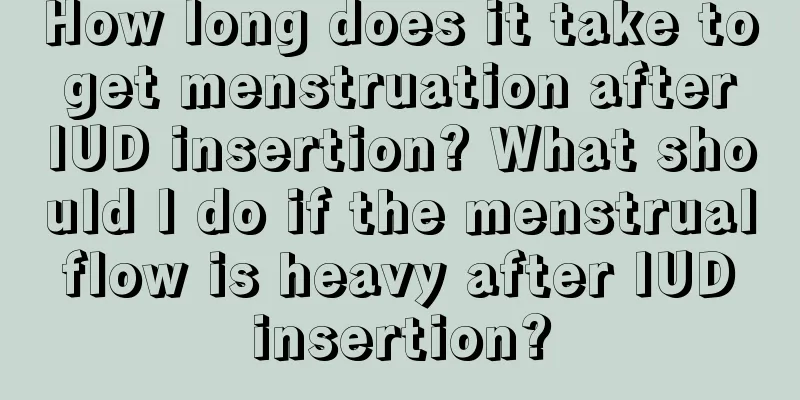Can I still get pregnant with endometriosis?

|
Endometriosis is a common gynecological disease that causes trouble for many women who want to get pregnant. So can you still get pregnant if you have endometriosis? How to treat endometriosis? How to prevent endometriosis? The following editor will give you a detailed introduction. Can I still get pregnant with endometriosis?Why can't a person with endometriosis get pregnant? It may be because she has scar tissue adhesions. If the ovaries are wrapped and adhered, the eggs cannot be captured and cannot reach the fallopian tubes. If the fallopian tubes and ovaries are adhered to the Douglas fossa, the possibility of pregnancy is also lower. In micro-mild endometriosis, there are only small spots or no scar tissue. Why can infertility occur? It may be related to inflammatory factors, immune factors, egg embryo quality problems, endocrine abnormalities, fallopian tube function or implantation problems. Endometriosis can affect fertility, but it does not mean that having endometriosis will lead to infertility. Especially for mild patients, the chance of pregnancy is not much different from that of normal people. Even severe endometriosis can get pregnant naturally. However, as the severity of endometriosis increases, scar tissue (adhesions) becomes more and more common, and the chance of natural conception decreases. So it is not that everyone with this disease cannot get pregnant. This is just an individual phenomenon. If you don't get pregnant, you need to do further examination. How to treat endometriosisConservative surgery: including laparotomy and laparoscopic surgery. The scope of surgery includes separation of pelvic adhesions, electrocautery or removal of pelvic lesions, uterine suspension, ovarian endometriosis cystectomy, and simultaneous removal of uterine fibroids. For patients with severe dysmenorrhea, it is often recommended to remove the presacral nerve. Normal ovarian tissue should be preserved as much as possible during the operation. It is suitable for young patients with persistent infertility, when conservative treatment is ineffective, or severe dysmenorrhea that cannot be relieved by drugs. The pregnancy rate after surgery is 40-60%. The recurrence rate after surgery is high, and some patients often need another surgery. Semi-conservative surgery: mainly removes the uterus and endometriosis lesions, and preserves ovarian function. It is suitable for women under 45 years old who have no fertility requirements, or those with extensive lesions who cannot preserve fertility, or those with uterine fibroids or adenomyosis. The recurrence rate after surgery is low, only 2-3%. Radical surgery: total hysterectomy and bilateral adnexectomy without preserving ovarian function. If total hysterectomy is difficult due to severe adhesions, subtotal hysterectomy or removal of only bilateral ovaries can be performed. It is suitable for those who are near menopause or young but have serious conditions. The incidence of postoperative menopausal syndrome is high. For those with severe symptoms, low-dose estrogen treatment can be given. If the medication recurs, the medication should be stopped in time. Oral contraceptives: They can reduce the level of pituitary gonadotropin and directly act on the endometrium and ectopic endometrium, leading to endometrial atrophy and decreased menstrual volume. Currently, low-dose, highly effective progestin ethinyl estradiol compound preparations are commonly used in clinical practice. The dosage is 1 tablet per day for 6-9 consecutive months. They are suitable for patients with mild endometriosis. Progesterone: Using artificial synthetic high-efficiency progesterone alone can inhibit the secretion of pituitary gonadotropin, resulting in a non-cyclical low estrogen state, and work together with endogenous estrogen to cause high progesterone amenorrhea and endometrial decidualization to form pseudopregnancy. The dose used is 3-4 times the contraceptive dose, and it should be used continuously for 6 months. Gestrogens: It has anti-progestin, severe anti-estrogen and anti-gonadal effects, which can reduce the estrogen level in the body and cause the ectopic endometrium to shrink and absorb. Take the medicine twice a week, 2.5 mg each time, starting on the first day of menstruation, and one course of treatment is 6 months. Danazol: It inhibits hormones and directly binds to the estrogen and progesterone receptors of the endometrium, inhibiting the proliferation of endometrial cells, ultimately leading to endometrial atrophy and amenorrhea. It is suitable for patients with mild and severe endometriosis and obvious dysmenorrhea. Take 200 mg orally starting on the first day of menstruation, 2-3 times a day, and continue taking the medicine for 6 months. How to prevent endometriosisPay attention to menstrual hygiene and sexual hygiene. Try to avoid mountain climbing, cycling, long-distance running and other activities that increase abdominal pressure during menstruation. Absolutely prohibit sexual intercourse during menstruation and avoid multiple sexual partners. Paying attention to the above issues can prevent menstrual blood from flowing back; Prevention of high-risk factors: Those with a family history of endometriosis should undergo regular gynecological examinations to detect endometriosis in time and receive early treatment. Late marriage is recommended, but childbearing is advisable at the right time; Actively prevent diseases that cause endometriosis and promptly detect hymen occlusion, cervical stenosis, reproductive tract obstruction, and vaginal agenesis. Once diagnosed, surgical correction should be performed promptly to prevent menstrual blood from accumulating in the uterus and flowing back into the fallopian tubes and pelvic cavity, leading to the occurrence of endometriosis. Regular physical exercise can enhance physical fitness, improve human immunity, and reduce the occurrence of endometriosis; Oral contraceptives Oral contraceptives can prevent endometriosis in women who do not want to get pregnant, and can also relieve symptoms in those who already have the disease. To reduce the chance of iatrogenic trauma, do not do gynecological examinations during the period, it is best not to do artificial abortion or do it less often, and those with heavy menstruation should try not to use intrauterine devices for contraception. Various fallopian tube patency tests, cervical freezing, electrocautery, forceps cutting and plastic surgery are prohibited or avoided before menstruation, and should be performed 2 to 5 days after the end of menstruation. It is also not advisable to squeeze the uterus by hand after artificial abortion. The above precautions can avoid bringing broken endometrial fragments into damaged tissues and avoid endometrial implants caused by surgical operations; Pay attention to dietary conditioning. The diet should be light, nutritious and easily digestible food. Eat more fresh vegetables and fruits, and avoid raw, cold, spicy, fried, fatty and stimulating foods. How to prevent endometriosis1. Pay attention to adjusting your emotions, maintaining an optimistic and cheerful attitude, and making the body's immune system function normally. The so-called "when righteousness is stored inside, evil cannot do anything" is this truth. 2. Pay attention to keeping yourself warm and avoid catching a cold. 3. During menstruation, all strenuous sports and heavy physical labor are prohibited. 4. If you have been diagnosed with endometriosis and your ovarian chocolate cyst is larger than 7 cm, you must keep your emotions stable and avoid overwork during menstruation or mid-menstruation. Once the tension in the cyst cavity suddenly increases, the cyst wall will rupture, causing acute abdomen. 5. Try to avoid artificial abortions and curettage as much as possible and implement family planning. |
<<: At what age does a baby stop wetting the bed? At what age does a baby stop wetting the bed?
>>: My baby is drooling a lot. What should I do?
Recommend
How often should a baby take a bath?
Many new parents don't know how often to bath...
Can babies eat wild rice stem? At what age can babies eat wild rice stem?
Wild rice is cool in nature and sweet in taste. I...
What are the dangers of milk coming out of the baby's nose? Is it okay for the baby to spit up milk from the nostrils?
It is normal for babies to spit up milk. Many bab...
Can floral water repel mosquitoes? What are the ingredients in floral water?
Everyone should be familiar with floral water. It...
How long after giving birth is it better to use a breast pump? How to relieve the pain in the nipples caused by breast pumping?
Breast pumps are baby products that most breastfe...
What should I do if my baby is anemic? What should I do if my baby stutters?
Anemia is very harmful to our body. Anemia in chi...
A complete guide to easily prepare complementary foods for babies before one year old
When the baby is four or five months old, mothers...
What is a doula delivery? How much does a doula delivery cost?
Childbirth is the most terrifying and difficult s...
How to help your baby stop feeding at night How to help your baby stop feeding at night
The most difficult thing for mothers is the baby ...
Is it necessary to go to a confinement center? How much does it cost?
Postpartum depression is an inevitable psychologi...
What should children eat to supplement calcium, iron and zinc? How to supplement calcium, zinc and iron for children who are deficient?
If a child has a pale complexion, is picky about ...
What causes children to be thin? What should children be checked for?
We all know that children are usually thin, but i...
Are there any benefits for babies to eat meat? 3 types of meat that should never be fed to babies
Meat is the most common food in our lives. Some p...
What is the reason for blood in breast milk? What should I do if there is blood in breast milk?
Many breastfeeding mothers may have experienced b...
Why can't my 4-year-old baby call me dad? How can I teach my baby to speak?
As parents, it must be the happiest thing when ba...









